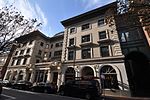The Harvard/MIT Cooperative Society (or The Coop, pronounced as a single syllable) is a Cambridge, Massachusetts retail cooperative for the Harvard University and MIT campuses. The general public is encouraged to freely enter and make purchases in all the Coop stores, but membership discounts and certain other benefits are restricted to Coop members. As of 2020, there are three store locations at Harvard, and two at MIT. The main store is located in the heart of Harvard Square, across the street from the Harvard subway station headhouse.
The Coop was founded as the Harvard Cooperative in 1882 to supply books, school supplies, and wood and coal for winter heating. MIT, following its move from Boston to Cambridge in 1916, invited the Coop to open a branch of the store at the Institute, where it has been present ever since.Today, the store is one of the largest college campus bookstores, an important resource for local students and their families to purchase textbooks, college logo merchandise, dorm room necessities, and so on. The store also offers the framing of diplomas, the ordering of class rings and engraved rocking chairs, and the rental of graduation gowns. The Coop has a regular program of talks and book signings focused on local authors, but also including speakers from around the world.
Only students, faculty, alumni and employees of MIT, Harvard, and the personnel of the hospitals affiliated with the Harvard Medical School are eligible to join. Membership cost $1 annually in 1882, and this fee has not been increased. Members may also purchase a Coop Diary, a little black combination pocket diary, academic year calendar, and address book. The Coop traditionally has disbursed its annual profits as a rebate to members in October of each year. As of July 1, 2014, the rebate program has been replaced with an automatic additional discount of 10% at the registers, for Coop members in good standing.The Coop stores are managed by Barnes & Noble College Booksellers, under supervision of a 23-person Board of Directors including 11 students elected by the student membership. Faculty, alumni, or officers of MIT or Harvard fill 11 seats, and the Coop's president serves ex officio.In 2014, the MIT branch announced that it was the first campus bookstore in the US to accept bitcoin payments.The MIT branch has for decades operated a modest department store and general bookstore at 325 Main Street, as Kendall Square's largest retailer. In February 2019, this store moved to smaller temporary quarters at 80 Broadway, to allow for demolition of the building housing its former location. A new, taller 16-story building will be constructed on the site, and the Coop is expected to move into a space larger than its temporary quarters, but possibly smaller than its previous space at that location.










